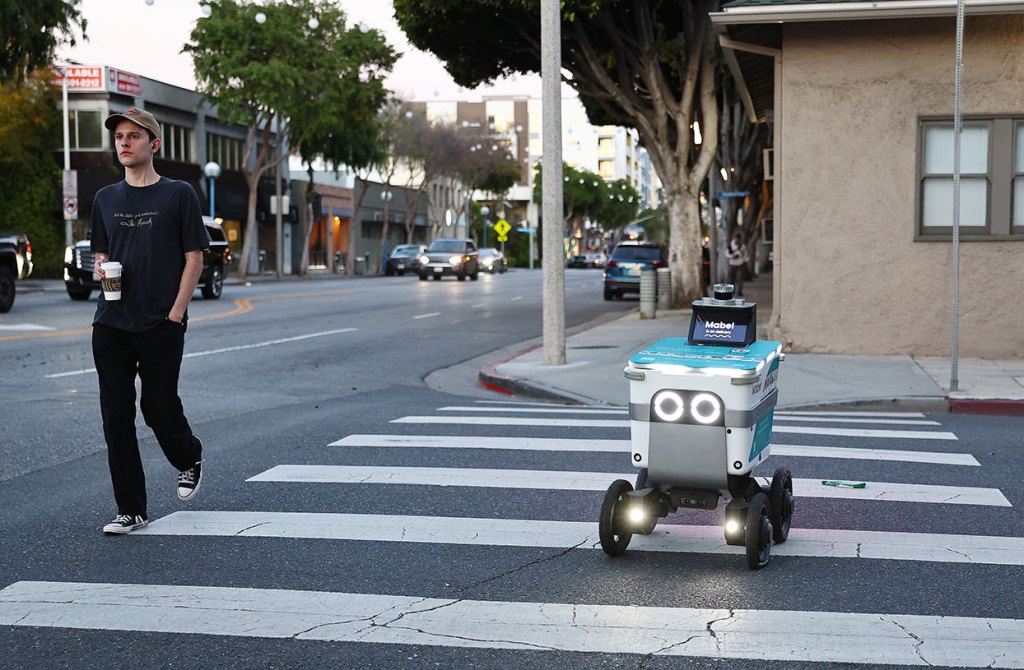Serve Robotics, the Uber and Nvidia-backed sidewalk robot delivery company, debuted publicly on the stock exchange Thursday, making it the latest startup to choose going public via a reverse merger as an alternative path to capital needed to fund growth.
The company, which spun out of Uber’s acquisition of Postmates in 2021, hits the Nasdaq under the ticker “SERV” with gross proceeds of roughly $40 million — “prior to deducting underwriting discounts and offering expenses,” per regulatory filings — at a share price of $4.
Serve completed its reverse merger with blank-check company Patricia Acquisition Corp. in August 2023, and at the same time secured $30 million in a round led by existing investors Uber, Nvidia and Wavemaker Partners, bringing its total amount raised at the time to $56 million. While Serve’s debut in the public markets comes from a reverse merger and not a SPAC, the two alternate paths to IPO are not too dissimilar. They both provide startups with a faster route to public markets. However, pulling this particular financial lever has its risks, especially if the company is pre-revenue or bringing in very little revenue. We need look no further than the countless fallen autonomous vehicle and electric vehicle companies to determine that this is not a golden ticket to longevity or profitability.
Like any publicly traded company, this path does require financial disclosures that provides information on revenue and profits or losses.
Serve brought in $207,545 in revenue last year, up from $107,819 in 2022, per regulatory filings. That’s at a loss of $1.5 million in 2023 and $1.04 million in 2022. However, Serve Robotics said it’s expecting enormous growth fueled by money generated by going public. Those funds will go toward funding R&D for future generations of robots, manufacturing activities, geographic expansion and general working capital and corporate purposes.
The startup also has some big revenue ambitions. Serve said it aims to generate between $60 million and $80 million in annual revenue, with contribution margins of over 50% and positive cash flow by the end of 2025. The company pointed to recent momentum, including its 25% month-over-month increase in deliveries since 2022 when the startup started delivering for Uber Eats.
Future growth will come from scaling the 100 robots deployed today in Los Angeles to up to 2,000 robots in multiple U.S. cities by the end of next year through a contract with Uber Eats. Serve has also enlisted Magna International as a manufacturing partner. Currently, Serve handles 300 restaurants via the Uber Eats and 7-Eleven platform in LA, but has its eyes on Dallas, San Diego and Vancouver, Canada, according to CEO Ali Kashani.
Serve projects that a big portion of its revenue will come from ads, Kashani told TechCrunch.
“I never thought that I would start a robotics company and then be in the ads business,” said a tired, but excited, Kashani in a phone interview minutes before the bell rang. It’s normal for companies to barely sleep before making their public debut out of a need to finalize all the financials and pure adrenaline. “But it’s great because this can help offset the delivery costs, so everybody wins.”
Kashani said Serve has had a lot of inbound interest for ads on its cute little sidewalk robots. On an annual basis, ad revenue can generate 25% to 50% of Serve’s total revenue, he said.
That’s one of the value propositions Serve has pitched to investors. Serve also says it can tap the rapid progress in AI and robotics to help reduce reliance on cars, because who needs something as small as a burrito delivered in a sedan anyway?
“The tailwind here is that these robots are a lot more scalable than a lot of the alternative approaches we have,” said Kashani. “If you look at a car, it has about 3,000 times more kinetic energy than one of our robots, so just by nature, these are safer… for pedestrians, bikers for everybody else, and I think that’s definitely recognized when we talk to cities. So there’s a lot of regulatory momentum, but you also have the fact that there is a shortage of labor. You can see companies in the delivery space are still not necessarily profitable, and they’re looking for ways to bring some mix of automation into their fleets. So we see a lot of interest in the solution that we’re providing.”
Serve’s robots operate at Level 4 autonomy, meaning they can operate autonomously within certain boundaries and conditions. However, Serve still relies on remote human operators to supervise operations in certain scenarios, like at intersections or if something unexpected happens.
Upon the closing of the merger, Uber held a 16.6% stake and Nvidia a 14.3% stake in Serve, according to regulatory filings. An April filing shows that stake will change to 11.5% and 10.1%, respectively, once the offering closes, but a Serve spokesperson caveated that those percentages may change given the $4 opening share price.
Sarfraz Maredia, Uber’s vice president of delivery and head of its Americas region, has joined Serve’s board.
Serve Robotics started its life as Postmates X, the robotics division of on-demand delivery company Postmates. The autonomous sidewalk robots started delivering to Postmates customers in multiple Los Angeles neighborhoods in 2018. It started a commercial service in 2020.
Uber acquired Postmates in late 2020 for $2.65 billion. Three months later, Postmates X spun out as an independent company called Serve Robotics. The new name was taken from the autonomous sidewalk delivery bot that was developed and piloted by Postmates.































Comment